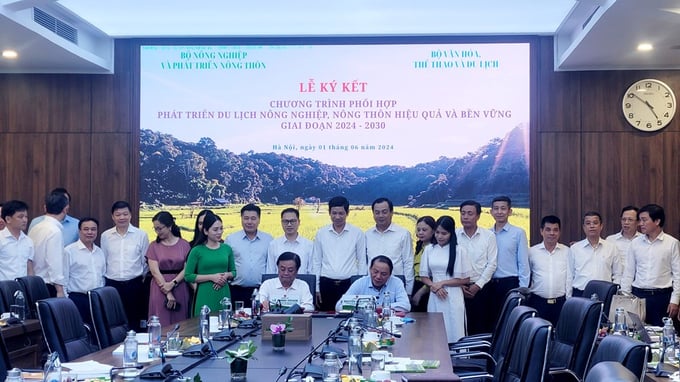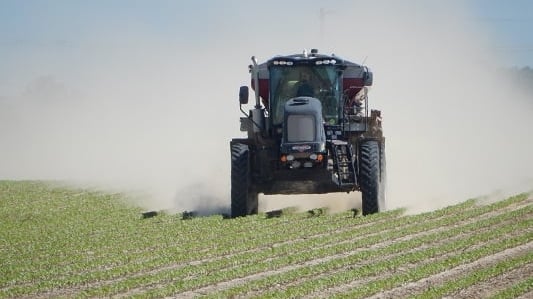May 17, 2025 | 20:47 GMT +7
May 17, 2025 | 20:47 GMT +7
Hotline: 0913.378.918
May 17, 2025 | 20:47 GMT +7
Hotline: 0913.378.918

Minister of Culture, Sports and Tourism Nguyen Van Hung and Minister of Agriculture and Rural Development Le Minh Hoan signed the Coordination Program to develop agricultural and rural tourism effectively and sustainably in the period 2024 - 2030.
The draft outlines a program that seeks to optimize the resources and capabilities of both sectors in order to foster agricultural and rural tourism in an inclusive, multifaceted, efficient, and sustainable manner. This program aims to meet market demands by effectively utilizing resources in agriculture, craft villages, ecological environments, rural landscapes, and the distinct cultural values of various regions.
The Ministry of Agriculture and Rural Development (MARD) and the Ministry of Culture, Sports, and Tourism (MCST) will collaborate efficiently to carry out Coordination Program No. 01, issued on November 20, 2020. The program's main objectives are to enhance cultural activities, foster rural tourism, and safeguard and advance cultural heritage as part of the National Target Program for New Rural Development for the period 2021-2025.
Both parties will enhance the progress of agricultural and rural tourism by utilizing the potential and benefits of agriculture, craft villages, culture, and the ecological environment of local areas. This will aid in the transformation of the rural economic structure towards a more diverse and integrated value system, promoting inclusivity and sustainability. Ultimately, this will lead to an improvement in the material and spiritual well-being of rural residents.
The Ministry of Agriculture and Rural Development (MARD) and the Ministry of Culture, Sports, and Tourism (MCST) have reached an agreement to strengthen their coordination efforts in order to foster the growth of agricultural and rural tourism. This will be achieved through:
To maintain uniformity in directing, guiding, and addressing challenges for localities, it is necessary to establish processes, policies, and guiding documents for the advancement of agricultural and rural tourism. These should be included into the socio-economic planning and land use plans of provinces and cities.
Carry out the allocated responsibilities outlined in the Resolutions and Programs of the Party and the State for tourism development, specifically focusing on the strategies and programs for tourism growth until 2030, as well as sustainable agriculture development from 2021 to 2030.
Improve communication to increase understanding about the significance of agricultural and rural tourism and broaden communication strategies to alter the perception of tourism exploitation.
Assist local areas in creating rural tourism sites that highlight regional specialized items, making use of the agricultural resources, natural landscapes, and traditional culture.
Enhance the training and elevate the caliber of human resources in rural tourism to achieve professionalism and effectiveness.
Facilitate the execution of promotional initiatives, specifically targeting rural tourism, and establish connections with travel-related endeavors in order to entice tourists. Create a database system focused on rural tourism to facilitate management and recommend strategies for development.
Coordinate and oversee inspections, supervision, and quality management of rural tourism services to ensure long-term and environmentally-friendly growth.
The Ministry of Agriculture and Rural Development (MARD) designates the Central New Rural Coordination Office, while the Ministry of Culture, Sports, and Tourism (MCST) designates the Vietnam National Administration of Tourism as the primary entities responsible for advising the leaders of the two ministries in developing detailed action plans, carrying out, monitoring, directing, inspecting, and overseeing the implementation of this Coordination Program.
According to Minister Le Minh Hoan, the worth of agricultural tourism is a comprehensive value that encompasses cultural and indigenous knowledge meticulously gathered by local individuals and blended into agricultural tourism offerings.
Minister Le Minh Hoan highlighted that the main obstacle in the progress of agricultural and rural tourism is the lack of coordination between the agriculture and tourist sectors. This necessitates a successful integration of the two sectors in order to create a concrete and beneficial outcome for all parties involved.
In addition, it is necessary to adopt an approach that emphasizes intangible values in conjunction with tangible values, such as economic benefits. This includes spiritual benefits, enhanced awareness for the rural community, and the rejuvenation and vibrancy of rural communities and farmers through tourism activities. In this manner, farmers might discern the augmented worth of agriculture and cultivate an affection for agriculture in rural regions.
At the discussion, Minister of Agriculture and Rural Development Le Minh Hoan and Minister of Culture, Sports and Tourism Nguyen Van Hung also agreed that a closer handshake is needed between the two ministries to focus on solving the problem and promoting sustainable development in the field of agricultural and rural tourism development.
Translated by Dieu Linh

(VAN) Hue City rigorously enforces regulations regarding marine fishing and resource exploitation, with a particular emphasis on the monitoring of fishing vessels to prevent illegal, unreported, and unregulated (IUU) fishing.

(VAN) Hanoi People's Committee has issued a plan on reducing greenhouse gas emissions in the waste management sector with 2030 vision.

(VAN) Vietnam's draft amendment to Decree No. 156 proposes a mechanism for medicinal herb farming under forest canopies, linking economic development to population retention and the sustainable protection and development of forests.

(VAN) In reality, many craft village models combined with tourism in Son La have proven effective, bringing significant economic benefits to rural communities.

(VAN) The international conference titled Carbon Market: International experiences and recommendations for Vietnam was successfully held recently in Ho Chi Minh City.

(VAN) According to the Project on rearranging provincial and communal administrative units, in 2025, the country will have 34 provinces/cities, 3,321 communes, wards, and special zones, and no district-level organization.

(VAN) The vice president of fertilizer with Stone X Group says the Trump administration’s tariffs are impacting fertilizer markets.